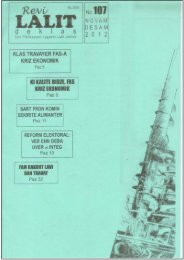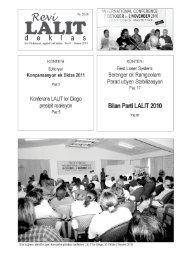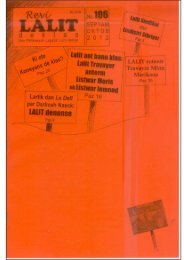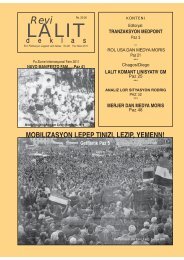Against communalism of the best-loser system - Lalit Mauritius
Against communalism of the best-loser system - Lalit Mauritius
Against communalism of the best-loser system - Lalit Mauritius
You also want an ePaper? Increase the reach of your titles
YUMPU automatically turns print PDFs into web optimized ePapers that Google loves.
Piecemeal Constitutional Amendments a-go-go<br />
The thorny provisions for communal classification and <strong>the</strong> <strong>best</strong> <strong>loser</strong> nomination exercise has<br />
caused <strong>the</strong> Supreme Court to have to be called in to decide what to do on numerous occasions.<br />
The firs time was in 1982 after <strong>the</strong> first 60-0. The shoddy drafting <strong>of</strong> <strong>the</strong> First Schedule meant<br />
that it did not cater for a 60-0 situation. So, after <strong>the</strong> Supreme Court had sorted out <strong>the</strong> 1982<br />
nominations, <strong>the</strong> government brought <strong>the</strong> first important Constitutional Amendments to <strong>the</strong> First<br />
Schedule. Then in 1991, we found that nei<strong>the</strong>r <strong>the</strong> First Schedule nor <strong>the</strong> Supreme Court<br />
judgement <strong>of</strong> 1982 nor <strong>the</strong> 1982 amendments had catered for <strong>the</strong> particular 57-3 situation we<br />
had got. The Supreme Court was again called upon. Fur<strong>the</strong>r amendments again had to be made.<br />
Even <strong>the</strong>n <strong>the</strong> judges remarked that “<strong>the</strong> question also arises as to whe<strong>the</strong>r now in <strong>the</strong> years to<br />
come” <strong>the</strong> <strong>best</strong> <strong>loser</strong> clause “could be properly implemented”. Now, in 2000, once again we see<br />
<strong>the</strong> spectacle <strong>of</strong> <strong>the</strong> poor Electoral Supervisory Commission unable to name or to decide not to<br />
name some <strong>of</strong> <strong>the</strong> communally classified <strong>best</strong> <strong>loser</strong>s. Nei<strong>the</strong>r <strong>the</strong> Schedule, <strong>the</strong> Supreme Court<br />
judgements nor <strong>the</strong> two sets <strong>of</strong> amendments, catered for <strong>the</strong> 54-6 situation ei<strong>the</strong>r.<br />
Talk about <strong>the</strong> law making an ass <strong>of</strong> itself.<br />
And not just any law: <strong>the</strong> Constitution itself, humiliated, again and again, by this wicked<br />
Schedule.<br />
<strong>Lalit</strong>’s proposal for electoral reform: Keep <strong>the</strong> <strong>best</strong> <strong>loser</strong>, but remove <strong>the</strong><br />
communal classification from it<br />
<strong>Lalit</strong> has a very simple proposal. It goes in <strong>the</strong> sense <strong>of</strong> history.<br />
Keep <strong>the</strong> Best Loser seats. On <strong>the</strong> contrary increase <strong>the</strong> number slightly. But remove all<br />
question as to “community” from <strong>the</strong> nominations.<br />
We proposee 63 elected members (first past <strong>the</strong> post), 3 per 21 constituencies, and <strong>the</strong>n 12<br />
nominations to be made by <strong>the</strong> Electoral Supervisory Commission on a strict “party score”<br />
basis, taking <strong>the</strong> names <strong>of</strong> unelected candidates, in an order pre-determined by <strong>the</strong> Party leaders<br />
from a list <strong>of</strong> 12 candidates from amongst those already standing for election and submitted to<br />
<strong>the</strong> Electoral Commissioner on Nomination Day, as priority “<strong>best</strong> <strong>loser</strong> nominations”. [This<br />
should be done regardless <strong>of</strong> <strong>the</strong>ir individual score, and be considered as a party list<br />
nomination.If ever all <strong>the</strong>se 12 are already elected (or elected and nominated) and <strong>the</strong> party is<br />
still “under-represented” in <strong>the</strong> National Assembly, <strong>the</strong>n <strong>the</strong> ESC should nominated <strong>the</strong> next<br />
unelected candidate with <strong>the</strong> highest score from that party, using <strong>the</strong> form <strong>of</strong> computation<br />
already used in <strong>the</strong> existing law.]<br />
The Best Loser <strong>system</strong> would thus be converted into an instrument with which to correct (after<br />
counting) for <strong>the</strong> under-representation <strong>of</strong> parties in terms <strong>of</strong> number <strong>of</strong> seats won relative to <strong>the</strong><br />
number <strong>of</strong> votes cast for <strong>the</strong> party on an over-all national level.<br />
This proposal means a dose <strong>of</strong> proportional representation by party. It also means that parties<br />
can put any order <strong>the</strong>y choose in <strong>the</strong>ir lists <strong>of</strong> 12 top priority for nomination as Best Loser. This<br />
way any “balance” a party may want to make sure <strong>of</strong> – sex, rural-urban, community, class, party<br />
leaders, strong candidates placed in difficult-to-win constituencies – can be catered for. But <strong>the</strong><br />
state will no longer classify people, nor do parties have any need to.<br />
And <strong>the</strong> 1972 Census figures for so-called “community” need never be used again for<br />
elections, nor would candidates have to classify <strong>the</strong>mselves, nor would <strong>the</strong> Electoral<br />
Supervisory Commission find itself unable to fulfill its Constitutional role every time<br />
<strong>the</strong>re’s an election, nor would <strong>the</strong> Supreme Court have to go through <strong>the</strong> degrading<br />
procedure <strong>of</strong> re-classifying individual citizens.















